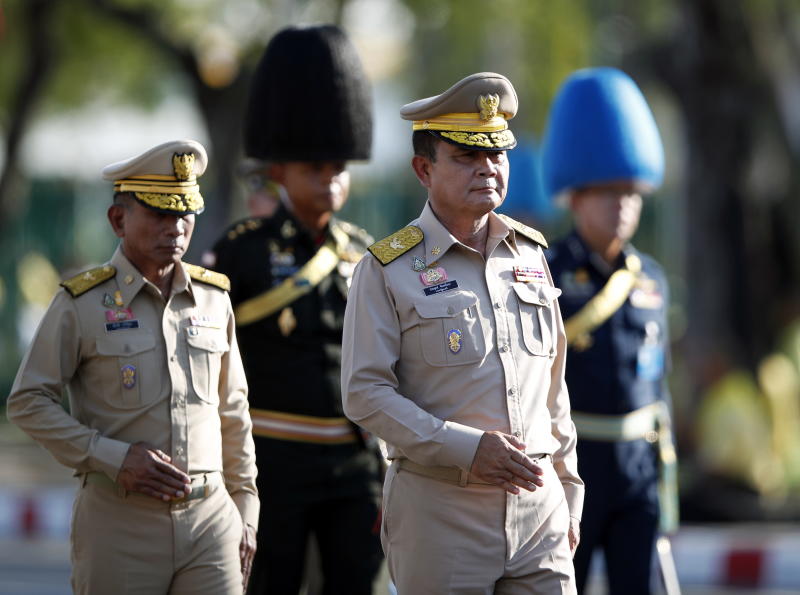Thailand's election results put Prayut closer to premiership
Sign up now: Get insights on Asia's fast-moving developments

Thai Prime Minister Prayut Chan-o-cha marches during a rehearsal for the King's coronation ceremony in Bangkok on April 28, 2019.
PHOTO: EPA-EFE
BANGKOK - Thailand's election agency on Wednesday (May 8) released results that relegated a coalition led by the former ruling Pheu Thai Party to a Lower House minority, giving a leg-up to Prime Minister Prayut Chan-o-cha's chances of returning as premier.
The results of the March 24 election were released on Wednesday evening amid controversy, after a ruling by the Constitutional Court in the morning affirmed the Election Commission's (EC) power to decide on its method of allocating proportional representation seats.
The future Lower House is made up of 350 Members of Parliament directly elected from constituencies, and 150 "party list" seats allocated according to the proportion of total votes each party wins.
According to the agency's calculation - with an election re-run still pending for one seat in the northern province of Chiang Mai on May 26 - Pheu Thai's seven-party alliance has just 245 seats in the 500-seat House of Representatives.
Twenty other parties also made it into the Lower House.
Pheu Thai's partners - Future Forward Party, the Pheu Chart Party, Prachachart Party, Seri Ruam Thai Party, Thai People Power Party, and the New Economics Party - are opposed to the return of Mr Prayut, a former coup leader.
The former army chief has been nominated as prime minister by Palang Pracharath Party, led by the four former ministers in his Cabinet. It bagged 115 seats, the second-highest number after Pheu Thai.
Palang Pracharath's likely coalition partners include the Democrat Party with 52 seats, and Bhumjaithai Party with 51 seats.
Also getting their foot in the door are 13 small parties, each with one seat. Analysts expect many to join a coalition led by Palang Pracharath.
Its leader Uttama Savanayana said just before the release of results: "I am confident that Palang Pracharath can work with parties which share the same ideas and form the government together."
Asean's second-largest economy has been controlled by a junta since 2014, when the military staged a coup that ousted the Pheu Thai-led government.
New laws introduced since then have cemented military influence in the future government. The 250-seat Senate now being formed is mostly picked by the junta, and is expected to be made up of many ministers in Mr Prayut's Cabinet as well as members of the legislative assembly appointed by the military over the past few years.
The Senate will, together with the Lower House, vote on who will become prime minister.
But the election also saw the rise of the young Future Forward Party, which pitched policies that resonated with many first-time voters.
Pheu Thai's seven-party coalition initially claimed to have bagged at least 255 seats in the Lower House. But its method of calculating party list seats differed from that eventually used by the Election Commission.
Politicians in the alliance say election rules allow parties to be allocated seats only if they win a minimum threshold of votes - in this case, 71,000. But the EC awarded seats to parties that won fewer votes than that benchmark. This shaved seven seats off Future Forward's tally.
Both Pheu Thai and Future Forward threatened legal action against the election agency.
Pheu Thai warned: "The party sees this as misconduct, intentional abuse of power and a violation of the Constitution, so it will take legal action against the EC in every possible way."


